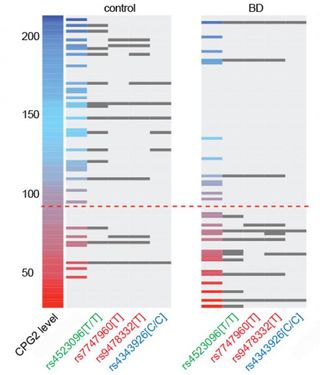Bipolar Disorder
Specific Gene Variants May Increase Risk of Bipolar Disorder
SYNE1 gene mutations are linked to less CPG2 and higher bipolar disorder risk.
Posted January 9, 2019

People diagnosed with bipolar disorder (BD) have significantly smaller amounts of a protein called "CPG2" in their brains, according to a new study by researchers from The Picower Institute for Learning and Memory at MIT. Recently, other genome-wide association studies (GWAS) on neuropsychiatric disorders have identified a risk locus for bipolar disorder containing the SYNE1 gene. This gene encodes multiple proteins, including CPG2.
What makes this MIT study significant is that researchers have identified (for the first time) how specific mutations of the SYNE1 gene may undermine the expression of CPG2 in ways that might disrupt the connectivity of neural circuits and appear to be correlated with a higher risk of bipolar disorder.
This paper, "Genetic Variants in the Bipolar Disorder Risk Locus SYNE1 That Affect CPG2 Expression and Protein Function," was published on January 4th in the journal Molecular Psychiatry. The research team was led by Elly Nedivi, who is a Professor of Neuroscience in the Department of Brain and Cognitive Sciences at MIT, along with first author Mette Rathje and colleagues in the Nedivi Lab.
Before diving further into this research, it's important to note that this study is correlative and does not identify a causal link between specific mutations of SYNE1, less abundant CPG2, and developing BD. A press release from The Picower Institute clearly states, "The researchers are not suggesting that the CPG2-related variations in SYNE1 are 'the cause' of bipolar disorder, but rather that they likely contribute significantly to susceptibility to the disease."
SYNE1 is believed to encode the expression of CPG2, which the authors describe as "a brain-specific protein localized to excitatory postsynaptic sites, where it regulates glutamate receptor internalization."
Previous research has implicated genetic and environmental factors in bipolar disorder etiology. However, until now, it has been difficult for scientists to pinpoint how genetic variants might influence BD risk. “It’s a rare situation where people have been able to link mutations genetically associated with increased risk of a mental health disorder to the underlying cellular dysfunction. For bipolar disorder, this might be the one and only,” Nedivi said in a statement.
The authors conclude, "Our findings link genetic variation in the CPG2 region of SYNE1 with a mechanism for glutamatergic synapse dysfunction that could underlie susceptibility to BD in some individuals. Few GWAS hits in human genetics for neuropsychiatric disorders to date have afforded such mechanistic clues. Further, the potential for genetic distinction of susceptibility to BD from other neuropsychiatric disorders with overlapping clinical traits holds promise for improved diagnostics and treatment of this devastating illness."
The National Comorbidity Survey (Harvard Medical School, 2007) estimates that 4.4 percent of U.S. adults will experience some form of bipolar disorder during their lifetime. If you'd like more information on BD, please visit the National Institute of Mental Health (NIMH) Health Topics page on Bipolar Disorder.
References
Mette Rathje, Hannah Waxman, Marc Benoit, Prasad Tammineni, Costin Leu, Sven Loebrich, and Elly Nedivi. "Genetic Variants in the Bipolar Disorder Risk Locus SYNE1 That Affect CPG2 Expression and Protein Function." Molecular Psychiatry (First published: January 4, 2019) DOI: 10.1038/s41380-018-0314-z


